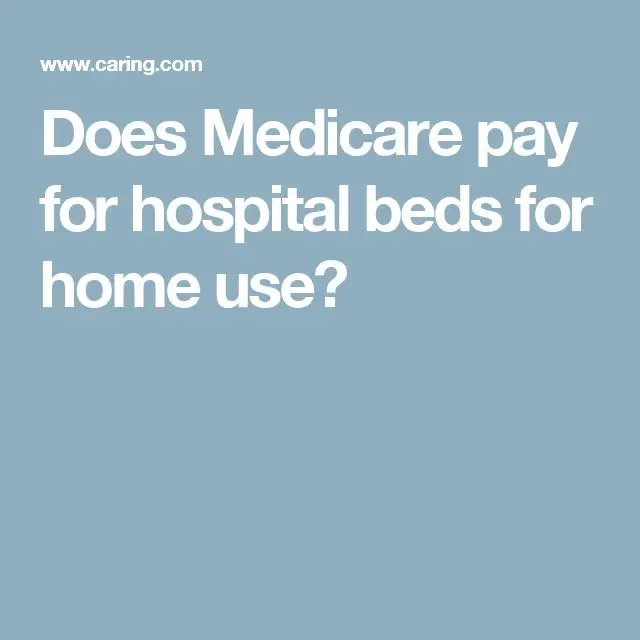Does Medicare Cover Unskilled Home Care Services
Medicare will not pay for unskilled home care if those are the only services needed. Personal home care services or homemaker services will only be covered if they are part of the skilled services detailed in the care plan. Medicare does not cover around-the-clock home care of any kind or meals delivered to the home.
Types Of Home Care Medicare May Cover
Medicare may cover skilled home care services such as part-time or intermittent skilled nursing care, physical therapy, occupational therapy, speech-language pathology services, medical social services, and injectible osteoporosis drugs for women. Additionally, Medicare may cover part-time or intermittent home health aide services that is provided in conjunction with skilled services. A home health aide can assist with ADLs, complementing the skilled services. Notably, Original Medicare will not cover custodial or personal care , when this is the only care you need.
Coverage for custodial or personal care by Medicare Advantage plans will be discussed in the next section.
The Pros And Cons Of Medicare Pace
Advantages of PACE program
- Its best for families who want their older adult to live at home instead of in a nursing home.
- Its a good option if the family can provide some care and wont need to rely on PACE for 24 hour care.
- Participants can un-enroll from PACE any time and go back to traditional Medicare and Medicaid programs.
- If an older adult needs nursing home care while enrolled in PACE, the program will pay for it.
Disadvantages of PACE program
Read Also: What Is Original Medicare Plan
Will Medicare Cover Physical Occupational And Speech Therapy
Medicare will pay for physical therapy when its required to help patients regain movement or strength following an injury or illness. Similarly, it will pay for occupational therapy to restore functionality and speech pathology to help patients regain the ability to communicate.
However, Medicare will only pay for these services if the patients condition is expected to improve in a reasonable, predictable amount of time, and if the patient truly needs a skilled therapist to administer a maintenance program to treat the injury or illness at hand.
Original Medicare Vs Medicare Advantage When It Comes To Home Care

To properly understand the differences between Original Medicare and Medicare Advantage plans when it comes to home care, it is important to first understand the difference between the two coverage options themselves:
People may receive their Medicare in two different forms, Original Medicare or via a Medicare Advantage plan.
Also Check: What Are The Benefits Of Having Medicare
What Types Of In
If your situation meets Medicare criteria, Medicare may cover in-home health care such as:
- Skilled nursing care
- Part-time home health aides
- Medical social services
Medicare benefits might also cover:
- Durable medical equipment
- Medical supplies
- Injectable osteoporosis drugs
If you qualify for home health care under Medicare, you generally dont have to pay any coinsurance or copayment. If you need durable medical equipment, youll typically pay 20% of the Medicare-approved amount as coinsurance. Read more about Medicare and durable medical equipment.
Does Medicare Cover Home Care Services
If your family is considering hiring home care service for a loved one, there may be financial assistance available to help offset the costs.
For many people over 65, Medicare is a key source of funding for medical benefits. Its common to ask how much of that might apply for in-home care.
Medicare will only pay for medically necessary care, so there are limited areas of care that may be covered.
Don’t Miss: How Do I Enroll In Medicare Plan B
How To Obtain Medicare Home Care
Most often, Medicare consumers receive home care from CHHAs. To obtain care, a doctor must fill out paperwork to validate the need for home health care. CHHAs then send a nurse to evaluate the patient and determine the services they require. Medicare consumers in the community who needs home health care can contact a local CHHA, which will likely be happy to assist them with obtaining the required paperwork so they can access care.
If someone is in a hospital or rehabilitation center and will need home health care upon their return home, a discharge planner at the facility will usually help with arranging these services. If you or a loved one are in this position, be sure to speak with the discharge planner about home health care arrangements upon the return home.
What Are The Steps For Getting Home Health Care From Kaiser
Home health care from Kaiser begins when a doctor orders it for a patient. Afterward, a representative from the home health care agency will contact the person to find out about their health needs and explain what to expect from home health care services.People receiving assistance may have their blood pressure taken, get help with their medications and receive instructions on how to use medical equipment. They might also have their blood drawn for lab tests and receive care for incisions or wounds. The home health care staff will also send details of a persons care to their doctor and report on their condition.
Recommended Reading: Is Upwalker Covered By Medicare
Does Medicare Pay For A Caregiver
-
Medicares coverage for caregivers varies on the type of care needed, how frequent care is needed, and where the care is being provided. Certain qualifications must be met for Medicare to cover a beneficiarys at-home care plan.
-
A wide range of providers are available to work as caregivers depending on a beneficiarys healthcare needs.
-
Acquiring medical supplies to fulfill healthcare needs is another necessity when it comes to at-home care. Medicare does cover durable medical equipment , but only if it meets certain qualifications and is supplied by a company that is in-network.
-
Its important for caretakers to fully understand the needs of the beneficiary and what insurance plan a beneficiary has.
When Should You Consider Home Health Care For Yourself Or A Loved One
Home health care is often helpful as you transition from hospital or facility to home after being treated for an illness or injury. You can continue your recovery in your home with assistance from trained healthcare staff and hopefully prevent a return trip to the hospital. Here are some examples of how home health care can benefit you:
- If you need wound care or intravenous antibiotics, a skilled nurse can come to your home to provide skilled care.
- An occupational therapist can help you adapt to your home environment by recommending and teaching you how to use equipment, such as a toilet riser or shower chair.
- A physical therapist can teach you exercises to help minimize your pain.
- A speech-language pathologist can help you devise ways to communicate your needs to your caregivers.
- A home health aide, supervised by a nurse, can assist you with bathing and grooming needs until you can safely care for yourself on your own.
- If you need DME
All home health services provided must be on your plan of care signed by your physician.
Medicare-covered home health care is limited. You may consider home care for help with personal care, household chores, getting to doctors appointments, preparing medications that you self-administer, or companionship. If you or your loved one struggles with dementia or a health condition that requires constant supervision and help, home care may be needed.
You May Like: Does Medicare Pay For Ophthalmologist
What Parts Of Nursing Home Care Does Medicare Cover
Medicare covers up to 100 days at a skilled nursing facility.
Medicare Part A and Part B cover skilled nursing facility stays of up to 100 days for older people who require care from people with medical skills, such as sterile bandage changes. Medicare does not otherwise cover the costs of long-term stays in nursing homes because most nursing home care is considered custodial care. However, it can cover short-term care in a skilled nursing facility if you meet the requirements. Some of the specific things covered by Medicare include:
- A semiprivate room
- Medical supplies and equipment
However, if you have a Medicare Advantage Plan, its possible that the plan covers nursing home care. Likewise, Medicare supplemental insurance may cover some associated costs. If you have Medicare drug coverage or a Medicare Advantage Plan with drug coverage, you can get coverage for prescriptions from a long-term care facility pharmacy that works with your plan.
Medicare also has a strict list of requirements you must meet to qualify, including:
Dont Miss: Which Cpap Machines Are Covered By Medicare
What Home Health Care Services Does Medicare Cover

Medicare will only cover services that are included in the plan of care that is developed by you, your home care agency, and your physician, including:
- Part-time or intermittent skilled nursing care
- Physical therapy
- Injectable osteoporosis medications for women
- Medical supplies and DME for use in the home
Recommended Reading: What Age Do You Apply For Medicare
Nursing Home Care Advantages
There are several benefits of nursing home care that people can enjoy, which include:
- Nursing home care typically enables people to live independently without performing household tasks such as grass mowing or home maintenance.
- Many nursing homes also offer social activities that allow residents to keep friendships and participate in other activities.
- Having access to needed nursing services and qualified people on hand to supervise a person can bring a sense of comfort to a person and their family.
- Nursing homes are secure and can be especially helpful for patients who need special care to stay safe.
Does Medicare Advantage Cover In
PayingForSeniorCare is committed to providing information, resources, and services free ofcharge to consumers that help seniors and their families make better decisions about senior living and care.
We may receive business-to-business compensation from senior care partnerships and/or website advertising. This compensation doesnt dictate our research and editorial content, nor how we manage our consumerreviews program. PayingForSeniorCare independently researches the products and services that oureditorial team suggests for readers. Advertising and partnerships can impact how and where products,services, and providers are shown on our website, including the order in which they appear, but theydont determine which services or products get assessed by our team, nor which consumer reviews getpublished or declined.
PayingForSeniorCare.com awards some companies with badges and awards based on our editorial judgment. We dont receive compensationfor these badges/awards: a service provider or product owner may not purchase the award designation orbadge.
Learn moreabout our mission and how we are able to provide content and services to consumers free of charge.
Also Check: Does Medicare Cover The Cost Of Cataract Surgery
Cost Of Hiring A Caregiver
When searching for a caregiver, its possible to narrow down a search by the rate one is willing to pay for care. Based on a survey by Genworth, the monthly median cost of having an in-home caregiver in 2020 was $4,481. That being said, the cost of having a caretaker can range depending on the rate desired, the amount ones Medicare or MA plan will cover, and where an individual lives.
What Is Medicare Home Health Care
Home Health Care is skilled nursing care and certain other health care services that you get in your home for the treatment of an illness or injury.
One of the services offered to senior citizens by Medicare is Home Health Services. Medicare recipients must qualify for services, and they must be recommended by the individuals primary care physician or specialty care physician.
Medicare beneficiaries who feel they may need Medicare home care should always look into whether they can actually qualify for Medicare home health services. It is not a general personal care or chore-worker service. Rather, Medicare home care covers limited, specifically defined at-home care related to diagnosed medical conditions, and sometimes includes personal care services.
These Medicare home health services must be prescribed by a physician, and provided through a licensed home health agency. The beneficiary must have a medical condition, or combination of conditions, that require periodic services from a skilled nurse or therapist. A plan of care will be developed that describes the specific services covered. Eligibility and coverage are evaluated strictly so the beneficiarys conditions and care needs must be aired fully.
If you or a loved one are in need of information related to your Medicare Home Health Benefits, Contact Us today or call 561-989-0441 for your free consultation.
You May Like: When Is Medicare General Enrollment Period
Who Can Receive Home Care Covered By Medicare
Individuals must have coverage through Medicare Part A and/or Medicare Part B and meet the following four criteria as set forth by Medicare.gov:
What Medicare Home Health Benefits Are Available
If you qualify for home health benefits, Medicare may cover the following services:
- Home health aides to help with personal activities such as bathing, dressing or going to the bathroom, if such help is necessary because of your illness or injury. Medicare covers these services only if youre also receiving skilled nursing or therapy.
- Medical social services, such as counseling for social or emotional concerns related to your illness or injury if youre receiving skilled care. It also covers help in finding community resources, if you need them.
- Occupational, physical and speech therapy with professional therapists to restore or improve your ability to perform everyday tasks, speak or walk after an illness or injury, or to prevent your condition from getting worse.
- Skilled nursing care on a part-time or intermittent basis that would require more active care such as changing wound dressings, assisting with feeding and injecting medicine through a feeding tube. Medicare stipulates that care must be provided fewer than seven days each week or daily for less than eight hours each day for up to 21 days.
Medicare may extend that limit if your doctor can predict when your need for daily skilled nursing care will end. Full-time or long-term nursing care typically wouldnt qualify for home health benefits.
Also Check: How To Become A Medicare Insurance Broker
What Are The Medicare Eligibility Requirements For Home Health Care
Before receiving home health care, you must meet Medicares requirements for it to be medically necessary, says Lindsay Malzone, Medicare expert for Medigap.com. According to Malzone, the following conditions must be met to qualify for Medicare-covered home health care:
- A doctor must certify that the patient is homebound.
- Home health care must be deemed medically necessary.
- A care plan must be established and regularly reviewed by a doctor.
- The patient must use a Medicare-approved home health agency.
Does Medicare Cover Skilled Nursing Care At Home

Medicare covers part-time or intermittent in-home skilled nursing care at a patients residence. These services are provided less than seven days a week or less than 8 per day across a 21 day span. If the patient is at a skilled nursing facility, the services will be covered by Part A and B Medicare.
Home health care services are provided by a licensed or certified nurse, usually through a home health care agency in a patients own home . They perform activities like administering injections, training patients to self-inject, tube feedings, changing catheters, wound care, and health condition assessment.
Related:Cost of Home Health Care vs Nursing Home
Don’t Miss: Does Medicare Pay For Stem Cell Knee Replacement
I What You Should Know About In
When people say in-home care, there are several different types of care to which they could be referring. This range of options is one of the appealing things about home care, as it can be customized to meet each individuals needs. In-home care can range from tasks as basic as providing companionship during the day to as involved as round-the-clock medical monitoring.
To help you better understand the different types of in-home care and how they differ from one another, weve broken the varieties of in-home care into three categories below.
Home Health Care Basics
The U.S. Centers for Medicare & Medicaid Services defines home health care broadly as the range of services that one may obtain at home while recovering from an illness or injury. For seniors, this could mean a brief period of care within the home or extended support across a continuum of care.
Home care services typically have a number of upsides over residential care facilities, including lower overall costs, improved convenience and comparable health outcomes. In addition to reducing the quickly growing demand for senior living facilities, in-home care can also help seniors maintain an more independent lifestyle, improve or sustain their health status and maintain social connections with their current community.
This type of care can take many forms, but a few common examples can include:
- Help with injection and medication management
- Changing dressings and cleaning wounds after a surgery
- Checking common vital signs, such as heart rate, blood pressure, temperature and respiration
- Assistance coordinating care between other providers
- Help with pain management
Read Also: Does Medicare Pay For Sleep Study
